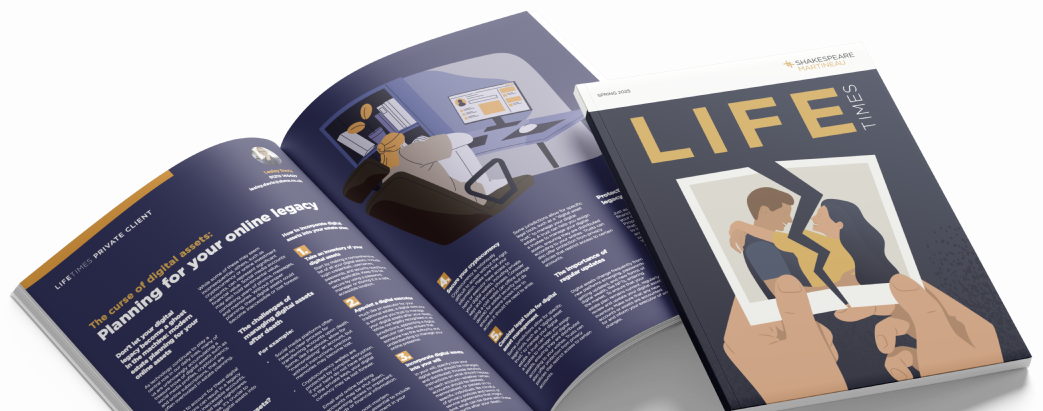Estate Administration Solicitors
Administering estates professionally and empathetically

Trusted estate administration with a personal touch
We understand that acting as a Personal Representative and administering an estate when someone has died can be an extremely emotional and testing time, particularly when it involves the estate of a close family member or friend. We know that when a loved one dies, you’ll want to focus on family and friends above all else, so you will need advisors by your side to help.
What is estate administration?
Estate administration handles legal and tax affairs after someone has passed away. It can be broken down into four key stages:
- Registering the death of the deceased and arranging the funeral.
- Determining the value of the deceased’s assets and liabilities and submitting an application for the grant of representation (this may also include the payment of any inheritance tax).
- Collecting in the various assets of the deceased and paying any debts they may have.
- Distributing the estate in line with their will (or the rules of Intestacy if there is no will), usually preparing estate accounts to show the position from the date of death to the date of distribution.
If the deceased held property at their death, the insurer needs to be informed that the individual has passed away. The policy should then be put into the names of the personal representatives. Read our guide on what to do when someone dies.
The process can take a long time and you are likely to be faced with unfamiliar and complex issues.
Estate administration involves many different stages, ranging from:
- Registering the death
- Organising the funeral
- Obtaining the Grant of Representation (probate)
- Calculating the correct Inheritance Tax liability and paying the same
- Distributing the estate to the correct beneficiaries
Many areas can trip executors up, not to mention the difficulties that can arise between grieving family members.
Unravelling the complex process of administering an estate requires advisers who are empathetic, pragmatic and alert to the broader legal implications resulting from a death. That’s where we come in; our compassionate advisors will support you every step of the way.
Wherever you are on your journey, our legal advisors can help. Call us today on 0330 024 0333 or complete our contact form.Our Estate Administration team
How our Estate Administration experts can help
Adminstrative processes
With family structures and personal and business affairs now more complex, you will need access to advisers who can handle the administrative process on your behalf and ensure that the final wishes of the deceased are carried out.
Legal documentation
We can draft the necessary legal documentation, collect in and encash the assets and pay liabilities such as tax liabilities arising both during and after the death of your loved one.
Home visits
We also understand that being with your nearest and dearest is a top priority – we can come to you. We do our utmost to remove some of the stresses associated with administering an estate, and if being in the comfort of your own home is what you need then our team ensures that we are there to help – no matter when and how long you need us.
Will drafting
If there is no Will in place, by default, the intestacy rules will apply, and our specialist team will help you to process the estate correctly and distribute assets to the right people.
Why choose Shakespeare Martineau?
- The process includes deciphering who is entitled to what and this can be a particularly complex process, which may involve advising on statutory trusts, instructing genealogists, or obtaining specialist insurance when those people cannot be found
- You may encounter difficulties from disappointed family members or friends who may believe they are entitled to a share of the estate. With the appropriate input from our experienced contentious probate team, we can help you to understand your options to handle the situation as a Personal Representative.
- With family structures and personal and business affairs now more complex, you will need access to advisers who can handle the administrative process on your behalf and ensure that the final wishes of the deceased are carried out.

Estate Administration frequently asked questions
A grant of representation is the legal document which is required to release the assets of the deceased for ultimate distribution to the beneficiaries. Depending on the value of the deceased’s assets it may be possible to use the small estates procedure at the deceased’s bank to release the assets. Therefore it may be useful in the first instance to explore whether a formal grant of representation is required.
There are three stages to applying for a grant of representation:
- Determine who is entitled to take out the grant – this might be the executor(s) named in the Will, or a person entitled as a beneficiary under the rules of Intestacy.
- Ascertain the value of the assets and liabilities of the deceased’s estate.
- Prepare an inheritance tax return (depending on the value of the estate and whether inheritance tax is due) before making an application to the probate registry. Read our guide on what lifetime gifts are exempt from inheritance tax.
There are a number of circumstances to consider in this instance:
- Were they the sole surviving executor?
- Did an executor have power reserved to them at the outset of the matter?
- Has the grant of representation been obtained?
It may be possible for the executor appointed under the deceased’s executor’s will to be appointed to carry on dealing with the estate administration. Alternatively, there are a set of legal rules which determine who can apply to deal with the administration of the estate and we can assist you in this regard.
It is possible to renounce your position as an executor, which will result in you giving up your right to act as executor in the estate. However, you are only able to do this if you have not already started dealing with the estate.
An alternative would be to have “power reserved” to you, which means that you will leave the remaining executors to act but you reserve the right to apply for the grant of probate if this is required at a later date for any reason.
The individual is deemed to die “Intestate” and the law determines who benefits depending on the deceased’s surviving family members and in what proportions. Read more on our dedicated Wills page.
How will I pay for the funeral or the inheritance tax bill?
The deceased’s bank, for example, will release funds for the payment of the funeral expenses or inheritance tax. However, it is likely that all other funds will be held until a grant of representation is obtained.
We have a free estate planning guide which covers everything you need to know about estate planning.
What our clients say about us
How the Estate Administration process works
Not everyone is aware of how the process of engaging Estate Administration solicitors works, so we’ve provided an overview below to give you some peace of mind
-
The first stage is to get in touch with us using the button below – you will then be assigned to one of our Estate Administration specialists. Alternatively, you can reach us on 0330 024 0333.
-
You’ll then receive a free 15-minute consultation within 24 hours via Zoom or telephone to discuss the issues you’re facing.
-
You are then provided with a transparent breakdown of our costs and, if you would like to proceed, we send you a pack of onboarding documents
-
Following this, we will guide and support you through the process of achieving a resolution that works for you and your family.
Download our free estate planning guide today!
Our guide features the following information to help you in the following areas:
- The benefits of estate planning include wealth preservation, control over assets, avoiding intestacy, protecting vulnerable beneficiaries, business succession, and peace of mind.
- A comprehensive checklist of the documents you will need for estate planning, such as a will, a lasting power of attorney, a trust deed, and a letter of wishes.
- General guidance for different scenarios, such as homeowners, young families, unmarried couples, high net worth families, family businesses, and elderly parents.
- How Shakespeare Martineau can help you with estate planning and what it will cost, as well as providing some important words, helpful resources, and contact details.
After filling out your information, you will receive a PDF guide that you can access anytime, whether you are on the move or have some spare time to review it.
If you’d like to speak to a member of our team, please fill out the enquiry form. We will aim to reply to your query within 2 hours
Need to talk to someone sooner? You can call use at the number below
Call Us: 0330 024 0333
Featured Wills, Trusts, Estates services
Wills and probate
It can be difficult to envisage a time when you’re not there to provide for your family. However, we are here to guide and support you with preparing a will so your wealth is protected for your loved ones into the future.
Powers of Attorney
No matter what age you are, making considerations about how your financial affairs and medical needs will be met if you lose capacity in the future is important. We can help you put a plan in place that works for you and gives you peace of mind.


















